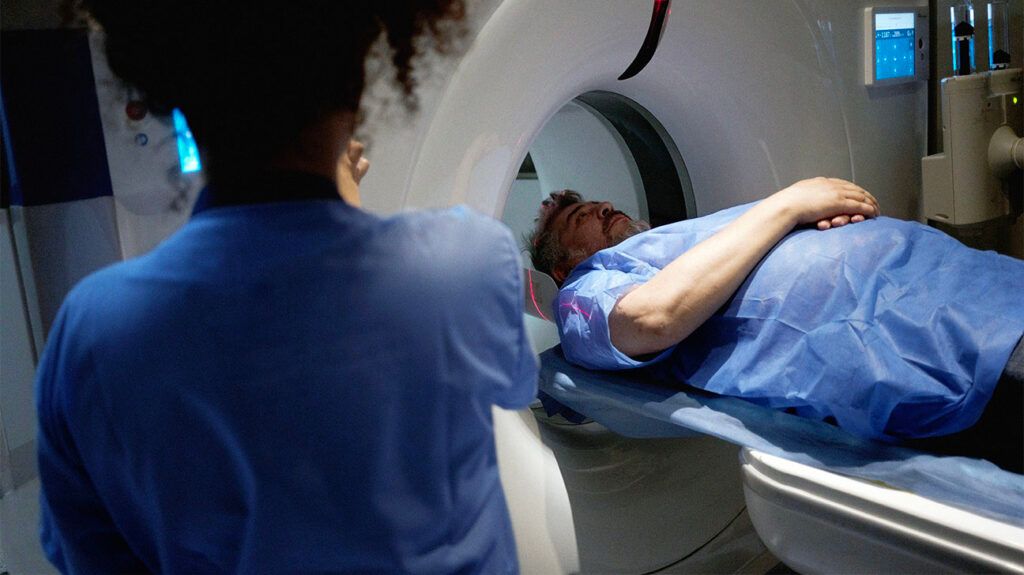Fulminant colitis is a rare but severe form of colitis that can be life threatening. It affects the entire lining of the colon, causing severe inflammation and potentially serious complications.
Fulminant colitis requires urgent medical attention. Symptoms include:
- severe abdominal pain
- bloody diarrhea
- fever
- signs of systemic toxicity, such as rapid heart rate and low blood pressure
IBD resources
Visit our dedicated hub for more research-backed information and in-depth resources on inflammatory bowel disease (IBD).

Fulminant colitis is a rare but severe form of colon inflammation that progresses rapidly. It can be life threatening.
Experts
Fulminant colitis requires urgent medical attention and treatment with intensive supportive care, high dose corticosteroids, or biologic therapies.
In some cases, complications such as bowel perforation or toxic megacolon mean a person needs surgical intervention, such as a colectomy. Early diagnosis and management are critical to improving outcomes.
The key symptoms of fulminant colitis are:
- severe abdominal pain and swelling
- continuous rectal bleeding
- profuse, bloody diarrhea
- fever and loss of appetite
- urgent need to have a bowel movement
- a feeling of incomplete bowel evacuation
- signs of systemic toxicity or sepsis, such as a fast heart rate and low blood pressure
These symptoms may worsen rapidly. If someone experiences them, they should contact a medical professional as soon as possible.
Other symptoms, such as a distended abdomen, can indicate complications like toxic megacolon.
In extreme cases, there may be symptoms of intestinal perforation, such as:
- sudden severe pain
- rigid abdomen
- shock
If a person experiences these symptoms, they need urgent medical attention. Intestinal perforation is a medical emergency.
Fulminant colitis can arise from a variety of causes and underlying conditions, including:
- Inflammatory bowel disease (IBD): Severe forms of ulcerative colitis are the most common cause of fulminant colitis, but Crohn’s disease can also be a cause.
- Infections: Infection with C. difficile is a major cause of fulminant colitis. It is often related to recent antibiotic use. Other bacterial, viral, or parasitic infections may contribute.
- Ischemic colitis: Ischemic colitis is a rare condition that occurs when the large intestine becomes inflamed and injured due to a lack of blood supply. It is a possible cause of fulminant colitis.
- Drug reactions: Certain medications, including nonsteroidal anti-inflammatory drugs (NSAIDs) or chemotherapy drugs, can cause colitis.
- Radiation colitis: People may develop colitis following radiation therapy in the pelvic or abdominal area.
Fulminant colitis can lead to severe complications if a person does not receive prompt treatment. Complications may include:
- Toxic megacolon: This is severe colon swelling that increases the risk of rupture. Symptoms include abdominal distension, pain, fever, and signs of sepsis.
- Bowel perforation: This is a tear in the colon wall that can cause leakage of intestinal contents into the abdominal cavity. It can lead to peritonitis, a life threatening infection.
- Sepsis and septic shock: These are systemic infections resulting from bacterial toxins entering the bloodstream. Symptoms include fever, rapid heart rate, confusion, and organ failure.
- Severe bleeding: Extensive inflammation can lead to significant blood loss from the colon, causing anemia or requiring transfusion.
- Dehydration and electrolyte imbalances: Frequent diarrhea and systemic inflammation can disrupt fluid and electrolyte balance, leading to kidney injury or cardiac issues.
- Surgical risks: An emergency colectomy may be necessary to prevent death. Surgery risks include infection and complications from anesthesia.
Management focuses on addressing the underlying cause, controlling inflammation, and preventing complications.
To treat fulminant colitis, a person may require the following:
Medication
High dose corticosteroids are the first-line treatment for IBD-related cases. They can help manage fulminant colitis by reducing inflammation in the colon.
Corticosteroids suppress the immune system’s overactive response, alleviating symptoms like abdominal pain and diarrhea.
This treatment is particularly effective in IBD-related colitis. It helps avoid complications such as toxic megacolon or perforation.
However, corticosteroids require careful monitoring due to potential side effects, such as infections or blood sugar changes.
Biologic therapy is also an option, which includes drugs such as infliximab or cyclosporine. Biologics use substances that derive from living organisms. Doctors may prescribe biologic drugs for steroid-resistant cases.
In cases when an infection has caused fulminant colitis, antibiotics can help target specific infections, such as C. difficile.
While in the hospital, a person may also need IV therapy to replenish lost fluids and electrolytes. This will help manage dehydration and electrolyte imbalances.
Surgery
A person may require surgery in cases of bowel perforation, toxic megacolon, or unresponsive inflammation.
The primary surgical option is typically a colectomy. During this procedure, a surgeon removes some or all of the colon. They may be able to keep some of it intact.
The surgeon may need to combine a colectomy with an ileostomy. In this procedure, the surgeon makes a small opening in the small intestine to divert stool into an ileostomy bag. This bag may only be temporary, but depending on the severity of the case, a person may need one long term.
In certain cases, a proctocolectomy, which removes both the colon and rectum, with ileostomy may be required, especially for long-term ulcerative colitis.
How is fulminant colitis diagnosed?
Diagnosing fulminant colitis involves clinical evaluation, laboratory tests, imaging studies, and sometimes endoscopic examination.
The goal is to confirm the severity of inflammation, identify underlying causes, and rule out complications.
Doctors will assess a person’s medical history, ask about symptoms, and perform a physical exam.
Tests may include:
- laboratory tests, such as a complete blood count (CBC) or stool test
- imaging studies, such as an abdominal X-ray or CT scan, to examine the colon
- endoscopy to examine the colon and take a colon biopsy for further analysis
Why is early intervention important in fulminant colitis?
Early intervention in fulminant colitis is crucial to prevent life threatening complications and improve outcomes.
Fulminant colitis progresses rapidly, causing severe inflammation, systemic toxicity, and complications like toxic megacolon, bowel perforation, and sepsis. Prompt treatment can reduce these risks and improve survival rates.
Fulminant colitis is a severe, rapidly worsening colon inflammation that can become life threatening without prompt treatment.
It often occurs as a complication of inflammatory bowel disease, such as ulcerative colitis, or infections such as Clostridioides difficile.
Symptoms include intense abdominal pain, bloody diarrhea, fever, and systemic signs of toxicity, such as rapid heart rate and low blood pressure.
Treatments may include high dose corticosteroids or biologics to control inflammation and antibiotics if an infection is present.
In severe cases, surgical intervention, such as a colectomy, may be necessary to prevent complications like toxic megacolon, perforation, or sepsis.
Early diagnosis and aggressive treatment are crucial to prevent complications and improve outcomes.


